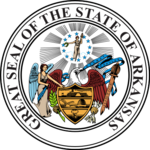Help us improve in just 2 minutes—share your thoughts in our reader survey.
Arkansas Natural Resources Commission Bond Measure (2026)
| Arkansas Natural Resources Commission Bond Measure | |
|---|---|
| Election date |
|
| Topic Bond issues and Flood infrastructure and management |
|
| Status On the ballot |
|
| Type Legislatively referred state statute |
Origin |
The Arkansas Natural Resources Commission Bond Measure is on the ballot in Arkansas as a legislatively referred state statute on November 3, 2026.
A "yes" vote supports authorizing the Arkansas Natural Resources Commission to issue up to $500 million in general obligation bonds to fund water-related infrastructure projects including water treatment and transportation, waste disposal, pollution abatement, drainage, irrigation, flood control, and wetlands and aquatic resources infrastructure. |
A "no" vote opposes authorizing the Arkansas Natural Resources Commission to issue up to $500 million in general obligation bonds to fund water-related infrastructure projects. |
Overview
What would the measure do?
- See also: Text of measure
The measure would authorize the Arkansas Natural Resources Commission (ANRC) to issue up to $500 million in bonds, titled Water, Waste Disposal, and Pollution Abatement Facilities general obligation bonds, to fund water-related infrastructure projects. Of that amount, up to $165 million could be issued to fund irrigation projects. No more than $60 million in bonds could be issued in any two-year period. The bonds would be repaid from the state's general revenue funds over up to 35 years.[1]
The ANRC would be responsible for submitting a written plan with criteria for selected projects to the governor. The governor would be required to consult with the state chief fiscal officer to determine whether payment of the debts would cause undue hardship on any other agency supported with general revenues and issue a proclamation to authorize the ANRC to issue the bonds.[1]
Revenue from the bonds would be used to make grants or loans to local governments, public entities, or private individuals for specified projects. The ANRC would be responsible for administering the bond program and determining the terms, sales methods, interest rates, and repayment structures of the bonds. The bonds would be exempt from state and local income, inheritance, and property taxes.[1]
Under the measure, the bonds could be used to fund projects related to:[1]
- water transportation and treatment;
- wastewater collection and treatment;
- pollution abatement;
- drainage and flood control;
- irrigation;
- the preservation and development of wetlands and aquatic resources; and
- agricultural, administrative, research, residential, recreational, commercial, or industrial projects.
The measure would allow the ANRC to issue refunding bonds, which are bonds used to repay the debt from prior bonds. Refunding bonds would not be subject to the $500 million limit and would not be subject to the governor's approval.[1]
When have Arkansas voters decided similar bond measures?
Similar measures that funded waste water, pollution and water treatment facilities were on the ballot in 1982, 1984, 1998, and most recently, in 2008. While promoting the bond measure, State Sen. Bart Hester (R-33), the sponsor of the bill, referenced the precedent of state voters to approve these measures.[2] All but one of those ballot measures, the one on the 1984 ballot, were approved.
How was the bond measure placed on the ballot?
- See also: Path to the ballot
A simple majority vote (50% plus one vote) is required during one legislative session for the Arkansas State Legislature to place a bond measure on the ballot. State Sen. Bart Hester (R-33) introduced the ballot measure to the Arkansas State Legislature on March 11, 2025 as Senate Bill 421. On March 19, the Senate approved the bill in a vote of 24-3 (three Republicans voted no). On April 7, the state House approved the bill in a vote of 86-3 (three Republicans voted no). Finally, on April 14, Gov. Sarah Huckabee Sanders (R) signed the bill into law, certifying it for the 2026 ballot.[1]
Text of measure
Full text
The full text of the ballot measure is below:[1]
Support
Supporters
Officials
- State Sen. Bart Hester (R)
- State Rep. Howard Beaty (R)
Organizations
Arguments
Opposition
Opponents
Officials
- State Sen. Jimmy Hickey (R)
Arguments
Campaign finance
If you are aware of a committee registered to support or oppose this measure, please email editor@ballotpedia.org.
| Cash Contributions | In-Kind Contributions | Total Contributions | Cash Expenditures | Total Expenditures | |
|---|---|---|---|---|---|
| Support | $0.00 | $0.00 | $0.00 | $0.00 | $0.00 |
| Oppose | $0.00 | $0.00 | $0.00 | $0.00 | $0.00 |
| Total | $0.00 | $0.00 | $0.00 | $0.00 | $0.00 |
Background
Arkansas historical natural resources bonds
In 1982, voters decided a bond measure that issued bonds for water resource development. It was approved, with 50.32% voting yes.[3] In 1984, Arkansas voters decided a bond measure that would have issued bonds for waste disposal development. It was defeated with 50.79% voting no.[3] Both measures would have permitted the Soil and Water Conservation Commission, the predecessor to the Natural Resources Commission, to issue those bonds.[4]
In 1998, Arkansas voters approved Question 1, which issued $300 million in general obligation bonds. Those bonds were issued to fund water, waste disposal, and pollution abatement facilities in Arkansas. In 2008, voters approved another bond measure which again issued $300 million in general obligation bonds that would fund water, waste disposal, and pollution abatement facilities.
SB 421 is the first Arkansas bond issue regarding water, waste disposal, and pollution abatement facilities in 18 years.
Issue 3 (2016)
The most recent ballot measure in Arkansas concerning the issue of bonds was held in 2016. In the November election, Arkansas voters approved Issue 3 with 65.34% voting yes. The ballot measure amended the state constitution, removing the cap on the amount of bonds the state is allowed to issue to help finance economic development projects and services. Prior to 2016, economic development bonds could not exceed 5% of the state's general revenue for that year; Issue 3 repealed that limit. Sen. Jon Woods (R-7), who sponsored the constitutional amendment, stated that the measure would allow Arkansas to work with corporations to bring more jobs and services to the state of Arkansas.[5] Clif Chitwood, a Mississippi County economic developer, stated that the amendment would "enhance [Arkansas'] ability to compete for large projects by removing the...restrictive five percent cap on Amendment 82 bonds.[6]
Issue 3 concerned only economic development bonds, referred to as Amendment 82 bonds, as they are permitted by Amendment 82 in the state constitution. The bonds proposed in Senate Bill 421 are not affected by the repeal of the bond cap.
Past bond issues on the ballot
A bond issue is a measure placed on the ballot by the state government or a local unit of government (city, county, school district) that asks voters to approve or deny the issuance of bonds. A bond is a debt in which the issuer owes the holders a debt and is obligated to repay the principal and interest at a later date. Prior to 2025, 30 measures dealing with bond issues appeared on statewide ballots in Arkansas. The first bond issue measure appeared on the ballot in 1880.
The most recently decided bond issue was decided in May of 2025. Ohio voters approved a bond measure which allowed the state to issue $2.5 billion in general obligation bonds to fund public infrastructure improvement projects.
Bond issues are often placed on the ballot in many states. As with all ballot measures, they are more common during even-numbered years, compared with odd-numbered years. Below is a chart showing bond issues and it approval between 2008 and 2024.
See also
|
External links
Footnotes
- ↑ 1.0 1.1 1.2 1.3 1.4 1.5 1.6 1.7 Arkansas State Legislature, "Senate Bill 421," accessed April 23, 2025
- ↑ 40 29 News, "Arkansas Senate bill aims to fix water and sewer problems across the state," accessed July 2, 2025
- ↑ 3.0 3.1 Arkansas Secretary of State, "Initiatives and Amendments 1938-2016," accessed June 27, 2025
- ↑ Encyclopedia of Arkansas, "Soil and Water Conservation Districts," accessed June 27, 2025
- ↑ The Baxter Bulletin, "Ballot's Issue 3 aimed at economic development," September 6, 2016
- ↑ NEA Town Courier, "Reasons to vote for Issue 3 in November," accessed June 27, 2025
- ↑ Arkansas Code, "Title 7, Chapter 5, Subchapter 304," accessed April 3, 2023
- ↑ 8.0 8.1 8.2 8.3 Arkansas Secretary of State, "Voter Registration Information," accessed July 29, 2024
- ↑ Arkansas Secretary of State, "Arkansas Voter Registration Application," accessed November 1, 2024
- ↑ Under federal law, the national mail voter registration application (a version of which is in use in all states with voter registration systems) requires applicants to indicate that they are U.S. citizens in order to complete an application to vote in state or federal elections, but does not require voters to provide documentary proof of citizenship. According to the U.S. Department of Justice, the application "may require only the minimum amount of information necessary to prevent duplicate voter registrations and permit State officials both to determine the eligibility of the applicant to vote and to administer the voting process."
- ↑ Arkansas Secretary of State, "Frequently Asked Questions," accessed July 29, 2024



